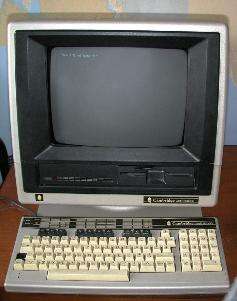Acorn Business Computer
 | |
| Developer | Acorn Computers |
|---|---|
| Manufacturer | Acorn Computers |
| Operating system | Panos, Concurrent DOS |
| CPU | 6502, Z80, 32016, 80286 |
| Predecessor | BBC Micro |
| Successor | Acorn Archimedes |
The Acorn Business Computer (ABC) was a series of microcomputers announced at the end of 1983 by the British company Acorn Computers. The series of eight computers was aimed at the business, research and further education markets. However, the ABC range was cancelled before any of the models were shipped to customers. The ABC 210 was subsequently relaunched as the Acorn Cambridge Workstation, sold in modest numbers to academic and scientific users.
The ABC range was developed by Acorn essentially as a repackaged BBC Micro, expanded to 64 KB RAM, to which was added (in some models) a second processor and extra memory to complement the Micro's 6502. The electronics and disk drives were integrated into the monitor housing, with a separate keyboard.
The Zilog Z80, Intel 80286 and National Semiconductor 32016[1] were all used as second processors in the various models. Two of the eight models produced, the Personal Assistant and the Terminal, had no second processor.[2]
Range and specifications
The following models were announced:
ABC Personal Assistant
- 64 KB RAM memory
- 640 KB floppy disk drive
- 6502 processor running at 2 MHz
- 4 MHz RAM bus
- Acornsoft View and Acornsoft ViewSheet in ROM
- Green phosphor monochrome monitor
ABC Terminal
- 64 KB RAM memory
- Diskless
- 6502 processor running at 2 MHz
- 4 MHz RAM bus
- VT100 terminal emulator in ROM
- Green phosphor monochrome monitor
ABC 100
- 64 KB RAM memory
- Twin 720 KB floppy disk drives
- Z80 processor (6502 acting as I/O processor)
- CP/M 2.2 operating system
- Green phosphor monochrome monitor
ABC 110
- 64 KB RAM memory
- 10 Megabyte hard drive
- Z80 processor (6502 acting as I/O processor)
- CP/M 2.2 operating system
- Colour monitor
ABC 200
- 512 KB RAM memory
- 10 MHz or 8 MHz RAM bus
- Twin 720 KB floppy disk drives
- 32016 processor (6502 acting as I/O processor)
- Monochrome monitor
ABC 210/Acorn Cambridge Workstation
This model entered production with a 20 MB hard disk as the Acorn Cambridge Workstation (ACW 443).
- 4096 KB RAM memory
- 6 MHz RAM bus
- 10 Megabyte hard disk
- 32016 processor (6502 acting as I/O processor)
- 32016 firmware (Pandora) in ROM. The ABC 210 was intended to run Xenix, however, the ACW was shipped with Panos.
- Colour monitor
ABC 300
- 1024 KB RAM memory
- Twin 720 KB floppy disk drives
- 80286 processor (6502 acting as I/O processor)
- Concurrent DOS 3.1 with Desktop Manager (GEM GUI – See screenshots in Nov 1984 Acorn User – p. 31)
- Monochrome monitor
ABC 310
- 1024 KB RAM memory
- 10 Megabyte hard disk
- 80286 processor (6502 acting as I/O processor)
- Concurrent DOS 3.1 with Desktop Manager (GEM GUI – See screenshots in Nov. 1984 Acorn User – p. 31)
- Colour monitor
References
- ↑ Goodwins, Rupert (December 4, 2010). "Intel's victims: Eight would-be giant killers". ZDNet. Retrieved March 7, 2012.
- ↑ http://www.computinghistory.org.uk/det/11871/Acorn-Business-Computer-(ABC)/
Notes
- "Chris's Acorns: Acorn Business Computer". Retrieved 2008-04-10.
- "Chris's Acorns: Acorn Cambridge Workstation". Retrieved 2008-04-10.
- Bright, Peter (April 1985). "Acorn ABC 310" (PDF). Personal Computer World. 8 (4).
- Attack, Carol (October 1988). "From Atom to ARC". Acorn User.
- Attack, Carol (November 1988). "From Boom to Bust". Acorn User.
- Attack, Carol (December 1988). "Back from the Brink". Acorn User.
- "Full Acorn Machine List", Philip R. Banks, 1999